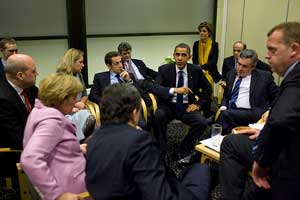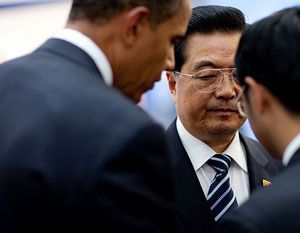In the weeks following the conclusion of the Copenhagen climate talks, three things have become very obvious: the Chinese were the biggest impediment to an international climate deal, the United States couldn’t do much to change that, and the Europeans are not very happy about the whole situation.
A lot of these broad points were lost in the final shuffle at the conference, as reporters (myself included) rushed to figure out what exactly the final agreement meant and what the next steps would be. But more important are the international dynamics that became very clear at last month’s meeting. Der Spiegel talked to German Environment Minister Norbert Röttgen after Copenhagen, in an interview that really highlighted all three of these concerns:
SPIEGEL: By cutting a deal with the emerging economies and giving the EU the cold shoulder, the US has ushered in the end of the era of the classical West.
Röttgen: The US as leader is part of the political concept of the West. But the US hasn’t led — instead it reached a deal with China that there wouldn’t be any leadership. In my perception, they have neither turned away from Europe nor really turned toward China strategically. In that sense I see an erosion of their leadership role. Barack Obama and Wen Jiabao have agreed to the lowest common denominator: China doesn’t want to lead, and the US cannot lead. The major blockade at the summit grew out of an unfortunate combination of weak leadership on the part of the Americans and Chinese power to impede progress.
SPIEGEL: But isn’t Europe the real loser? It was unable to push through any of its objectives.
Röttgen: No, Europe is not the loser because it presented itself as a unified bloc at the summit, with clear goals and a solid strategy. That was one of the few really positive experiences in Copenhagen and vitally important to our role in this new world order. We have shown what Europe’s role could be.
SPIEGEL: Perhaps Europe has a role, but Europe has no power.
Röttgen: We cannot solve the climate problem alone because, in this sense, our emissions are too low. Our share of global emissions is only about 14 percent. We could stop emitting CO2 tomorrow and global warming would still be catastrophic. On this issue those who emit the most have the greatest power — unfortunately.
Probably the best story to appear in the days following the talks was a piece in The Guardian documenting what actually went down in the the meetings between China, the US, and other major players. The conclusion: “China wrecked the talks, intentionally humiliated Barack Obama, and insisted on an awful ‘deal’ so western leaders would walk away carrying the blame.”
Both are recommended reading in these first week of 2010, the new target year for an international climate accord.















